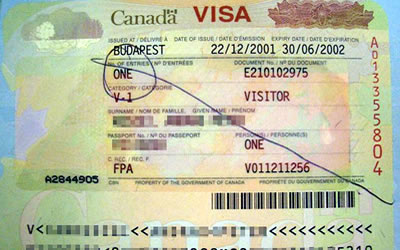On May 15, 2016, the Canadian Government will be implementing a new entry requirement for prospective visitors flying to Canada from visa-exempt countries. Based off the US system, the new Electronic Travel Authorizations or eTAs will be required for all foreign nationals that don’t require a Temporary Resident Visa (TRV) to enter Canada on a non-permanent basis, aside from citizens of the US.
On May 15, 2016, the Canadian Government will be implementing a new entry requirement for prospective visitors flying to Canada from visa-exempt countries. Based off the US system, the new Electronic Travel Authorizations or eTAs will be required for all foreign nationals that don’t require a Temporary Resident Visa (TRV) to enter Canada on a non-permanent basis, aside from citizens of the US.
Under the new eTA system, Canadian immigration authorities will be able to prescreen passengers for admissibility before they arrive in the country by air. Previously, the systematic screening of people from Visa-exempt nations did not occur until their arrival on Canadian soil, with many unwanted arrivals having to be turned back once landed in the country. To apply for a Canadian eTA online via credit card, it costs $7 CAD and authorization is valid for a period of five years from the day it is issued or until the applicant’s passport expires, whichever comes first.
Requirements and Processing Times
While it is still possible to apply for an eTA via traditional paper methods, it is a lot quicker and easier to apply online. Application requirements include: full name, gender, date of birth, place of birth, address, nationality, and passport number. Due to the fact the eTA program is still new, the Canadian Government has yet to come out with definitive processing times. This being said, for most online applications eTAs should be processed within a few minutes. If your eTA takes any longer, it is likely that it is being held for further processing and an email containing additional instructions will be sent to you within 72 hours.
eTA Denial
In accordance with policies of Citizenship and Immigration Canada (CIC), individuals may be denied an eTA if they “have been convicted of a crime, including driving under the influence of alcohol or drugs (DUI).” Any foreign nationals with criminal record, especially if the offence occurred less than 10 years ago, may be denied a Canadian eTA.
If you plan to apply for eTA when it is available, you should be aware of the possibilities for inadmissibility. A total of 7,055 visa-exempt foreign air travelers were deemed inadmissible to Canada from 2012–2013, causing considerable expenses, delays, and other inconveniences for them, their fellow travelers, the airlines, and the Canadian government. Inadmissibility may result from criminality, including involvement in espionage, terrorist organizations, organized crime groups, international human rights violations, war crimes, and other offenses against humanity. You may read more about criminal inadmissibility here. Besides criminality, other reasons for being denied entry to Canada include serious conditions endangering public health, such as tuberculosis or other contagious diseases. Read more about medical inadmissibility here.
How to handle eTA denial
At this time, Citizenship and Immigration Canada (CIC) does not have a formal repeal process for eTA application denial. This being said, a traveler may reapply for an electronic travel authorization once their situation has changed substantively, or they have new information to add. If a traveler is denied an eTA for reasons of criminality, this can be overcome if they are issued a Temporary Residence Permit (TRP) or Criminal Rehabilitation (CR). To speak to an immigration expert on being granted a TRP or CR, contact our law firm.
Additional Information
Travelers from any one of the following countries require an eTA to get into Canada by air: Andorra, Anguilla, Australia, Austria, Bahamas, Barbados, Belgium, Bermuda, Brunei, Chile, Croatia, Cyprus, Czech Republic, Denmark, Estonia, Finland, France, Germany, Greece, Hungary, Iceland, Ireland, Israel, Italy, Japan, South Korea, Latvia, Liechtenstein, Lithuania, Luxemburg, Malta, Monaco, Netherlands, New Zealand, Norway, Poland, Portugal, San Marino, Singapore, Slovakia, Slovenia, Spain, Sweden, Switzerland, Taiwan, Turks and Caicos, and United Kingdom (UK).
Along with their new eTA system, Canada is also implementing an Interactive Advance Passenger Information (IAPI) system that allows the Government to confirm with airlines before the flight whether travelers who need an eTA have been granted one. If a traveler requiring an Electronic Travel Authorization decides to forego applying for one, they will be denied at the gate and risk missing their flight.
If you are interested in immigrating to Canada, get assessed on your eligibility to enter and explore your options by filling out our Free Online Assessment form.
FWCanada is a Montreal-based immigration law firm that provides professional legal services on Canadian immigration. For more tips and updates on Canadian immigration follow FWCanada on Facebook, Twitter, and Linkedin.




